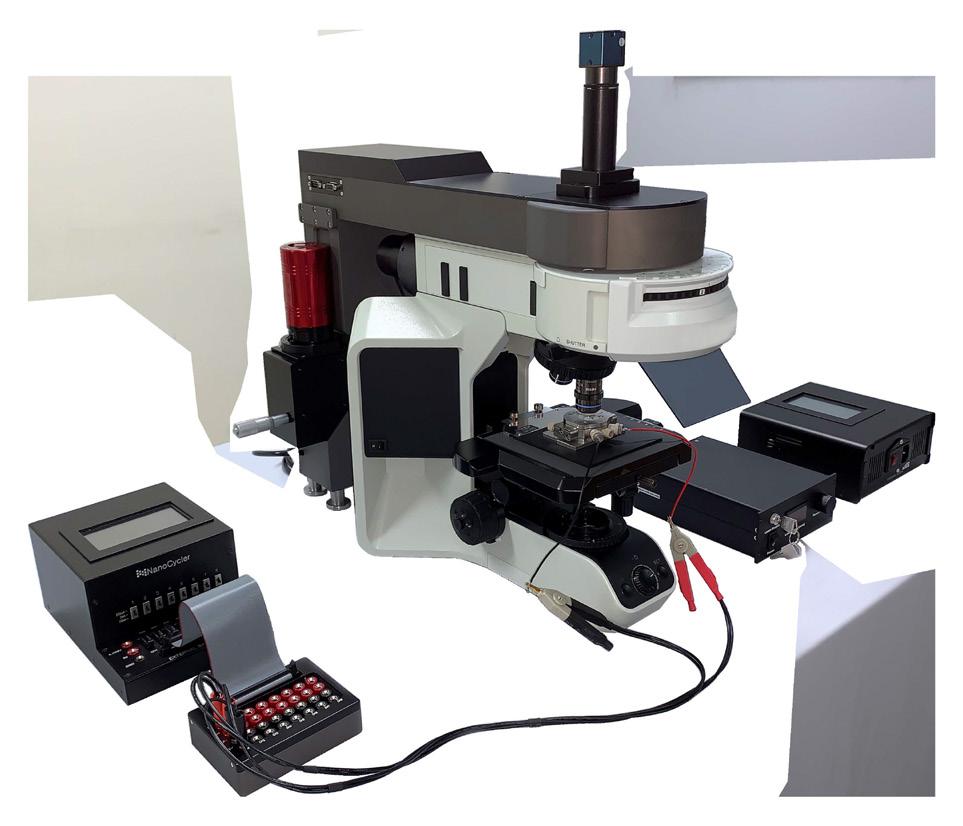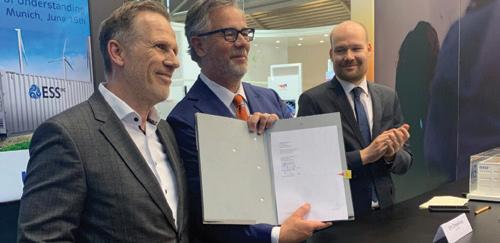
3 minute read
ESS in 50MW iron flow Germany battery project
Battery storage firm ESS announced plans on June 15 to build a 50MW/500MWh iron flow battery system in eastern Germany in partnership with domestic energy firm LEAG.
The flow battery system at the Boxberg Power Plant site is to be commissioned in 2027, following definitive agreements and financial close for the project, which are expected in the third quarter of this year.

ESS said the 50MW battery module is set to become a standardized building block in LEAG’s plan to deploy 2GWh-3GWh of long duration energy storage.
LEAG and partners plan to invest €200 million ($217 million) and say additional investments are expected as plans progress.
LEAG is a major operator of large-scale lignite mining and coal-fired generation in eastern Germany and wants to transform the coal-dependent region.
The firm plans to develop 7GW-14GW of renewable generation paired with 2GWh-3GWh of energy storage and 2GW of green hydrogen production.
Wind and solar generating infrastructure is already being developed at Boxberg.
India to review EV policy amid lithium ion over-reliance on China
India’s drive to encourage increased take-up of EVs is set to be reviewed amid fears of an over reliance on China, according to the India Lead Zinc Development Association.
ILZDA said in its latest e-newsletter, released on June 14, that the powerful NITI Aayog policy thinktank — also known as the “brains trust” advising Indian prime minister Narendra Modi — plans to review policies on lithium ion-powered EVs because about 75% of the vehicles are imported from China.
A section within India’s government reckons the country should not be heavily reliant on China and should instead explore other green sources to power future vehicles, ILZDA said.
NITI Aayog director Sudhendu Sinha told the International Conference on Lead & Lead Batteries in
EMEA director of ESS Alan Greenshields told Batteries International the power module for Boxberg will be built at the company’s Oregon plant in the US — but there are “ongoing discussions about the right point in time” to also have the firm’s batteries assembled in Europe.
New Delhi last December that the industry should be quick to counter any suggestions that new energy technologies could replace lead as a traditional battery industry.
Sinha said India could not become reliant on any particular battery chemistry or technology and warned that while a number of battery technologies can coexist, “those that are not focused on safety, the environment, safe and sound disposal and traceability will gradually become extinct”.
Nano One in LFP collaboration with Our Next Energy
Nano One Materials and Our Next Energy have signed a joint development agreement to collaborate on the validation, qualification and production of a North American supply of LFP cathode active materials (CAM), the companies said on June 14.
The CAM will be produced at Nano One’s Pilot plant in Candiac, Quebec for potential use in cells for Our Next Energy’s Aries and Gemini energy storage system batteries.
Nano One said it is repurposing the Candiac site to use its patented One-Pot process for the pilot production of LFP CAM, with re-commissioning scheduled for the third quarter of 2023.
Dan Blondal, Nano One CEO and founder, said the partners aimed to develop a “robust and economicallyresilient LFP battery supply chain that is decoupled and environmentally differentiated from the dominance of the overseas market”.
Our Next Energy started production of its Aries LFP battery pack earlier this year.
The company is also building its first battery cell factory, ONE Circle, which is a 20GWh facility in Michigan that should start operations in 2024.
Nano One announced in February it had completed a key milestone in its cathode materials and techno-economic modelling process with an unnamed global auto manufacturer.
ABB starts up 50MW BESS in Philippines
ABB has started up the 50MW BESS it supplied to Universal Power Solutions to strengthen the reliability and stability of the grid on the main Philippines island of Luzon.
ABB said on June 7 its NMC LFP system was its first eStorage Max, preengineered, modular, largescale BESS delivered in the Asia-Pacific region.
Financial details of the project in Limay were not disclosed.
ABB said Limay forms part of a broader contract with Universal, part of San Miguel Corporation Global Power Holdings, for a total 240MW BESS capacity to support the grid on the islands of Luzon and Visayas.
ABB said the Philippines aims to achieve 35% renewable energy generation by 2030 and 50% by 2040.
Calogero Saeli, Global product group manager at ABB, said the project will ensure that the grid is more stable and able to cope with reliability challenges associated with moving to a stronger mix of renewables.
in Raman customisation.
Introducing our Raman microscope integrated with a battery cycler for Li-Ion battery research
For research on battery for both Raman spectroscopy and battery cycling
• Simultaneous test on Raman and battery cycling at error margin >= 0.1 seconds and at a regular interval
• 200 x 200µm Raman mapping on 40X
• For use with optical cells*
• 0.0002mA~ current control www.nanobase.co.kr nbsales@nanobase.co.kr










